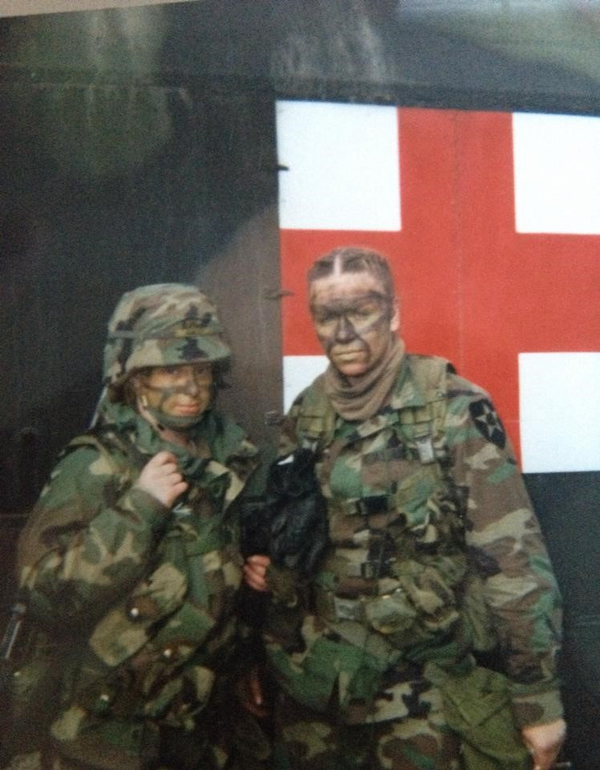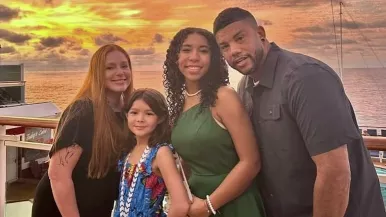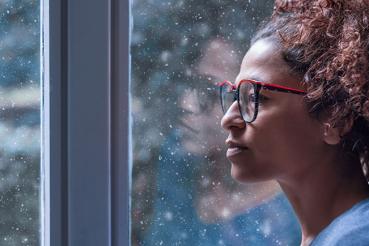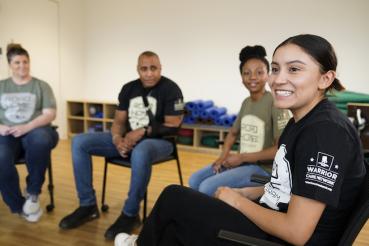How did U.S. Army veteran Jessica Burgans adjust from a deployment in Iraq to home life?
“I didn’t,” she said.
Less than a year after Burgans graduated high school, she joined the Army as a combat medic. After serving with the 2nd Infantry Division in South Korea near the Demilitarized Zone, her unit was deployed to Ramadi, Iraq, in 2004. There, Burgans worked at Charlie Medical Center.
Throughout the turmoil of war, Burgans witnessed decapitations, amputated limbs, and severe abdomen and head injuries. Ninety-nine people from her unit, alone, died.
Midway through her time in Iraq, Burgans was recruited to a Lioness Team — a group of women soldiers trained in advanced hand-to-hand combat and advanced weaponry. At this time, women were not allowed to serve on the front lines. To circumvent this rule, the team served in two-week rotations to support the infantry division.
“I was in the act of war for two weeks at a time, and then I would come back and engage in the repair of war at Charlie Med,” Burgans said.
Searching for a new normal

After leaving the military around 2006, Burgans experienced symptoms of post-traumatic stress disorder.
When fireworks went off on New Year’s Eve, she hid under the table at a club among partygoers. After landing her dream job as a flight attendant, she had a panic attack when called to work on a flight to Kuwait.
“I don’t know what happened,” she said. “I just remember blacking out and waking up hugging a pole and not being able to make the flight. I ended up getting fired."
Subsequently, Burgans was involuntarily held at the Veterans Affairs, or VA, psychiatric ward in Washington, D.C., leading to a PTSD diagnosis. The care she received in the following years was insufficient and inconsistent.
For nine years, she self-medicated with alcohol, went through 14 jobs, moved six times — eventually landing in Washington state — and got married and divorced.
In 2015, when Burgans found out she was pregnant with her second child and noticed her 6-year-old was experiencing secondary PTSD symptoms, she sought help again.
She turned to a retreat through QMissions’ Operation Restore Hope. Being surrounded by other veterans with shared experiences helped heal her mind, body and spirit — a more fulfilling experience than once-a-week counseling.
“That was my pivotal moment of starting to get better,” she said. “It was the first Memorial Day in nine years that I wasn’t blackout drunk. My husband and I learned a lot about PTSD, and I felt that brotherhood of group therapy.”
Finding the Road Home
A counselor from Operation Restore Hope recommended that Burgans attend the Road Home Program’s accelerated brain health program for additional care. She attended Cohort 17 in June 2017.
“I was lifted out of my everyday routine, away from my obligations as a mom and a wife and an employee so I could really focus on myself and getting better,” Burgans said. “There’s only so much work you can put into yourself meeting with a counselor once a week for one hour. We would barely unscrew the cap and then have to shut it. Being at the Road Home for three weeks, I spent the whole time with my cap off, and it was safe and supportive.”
Burgans remembers Brian Klassen, PhD, clinical director of the Road Home, telling her cohort to trust the process. She soon learned what that meant as she began to experience post-traumatic growth.
“At the Road Home, I was with people who had very similar experiences and struggles as me,” she said. “It was really critical for my marriage, my life, my parenting — for everything.”
Traveling down the road to help others
Burgans’ experiences with individual and group therapy inspired her to pursue a career helping others.
In 2019, she began overseeing in-school suspensions at a high school. She enjoyed working with students, but COVID-19 disrupted her job. She prayed about what to do next and, after applying, was accepted by a two-year accelerated program that enabled her to earn her master’s in counseling in August 2022. She began working in private practice in December 2022.
Now a licensed mental health counselor, Burgans provides marriage counseling, works with adolescents and serves as many veterans as possible. She aspires to work with more veterans and share mental health knowledge with larger groups through pro bono services.
“It would be the most fulfilling, rewarding and life-giving if 80% of my clientele were veterans,” she said. “I’m building the skills, knowledge and experience for whatever God is preparing me for next.”
Burgans’ approach to providing counseling is informed by her own experiences receiving it. When she begins seeing a new client, she tells them how important it is for them to feel their counselor is a good fit and someone with whom they can build a strong therapeutic alliance.
“I say that because I wish somebody would’ve said that to me,” she said. “I would have grown nine years before I did if someone had pointed me in the right direction.”
In addition to her work as a counselor, Burgans cohosts “The Mental Health Janitors Podcast” with her friend Aaron Quinonez, a Marine combat veteran who founded and introduced her to QMissions’ Operation Restore Hope years ago. The podcast’s tagline is “Helping you clean up the mess in your head,” and it covers a wide variety of mental health topics.
“We wanted to create a safe place for veterans to learn how to start building tools and resilience on their own, until they’re ready to ask for help,” Burgans said.
When veterans are first starting their mental health journey, the most important thing is for them to take ownership of their growth, Burgans added.
“You get out of things what you put into them,” she said. “Going to the Road Home Program was a pivotal moment for me because it was a volunteer program. I had a choice to be there or not, and I learned, within the first couple of days, that it was going to be hard. But I gave it all I had, and that’s one of the major reasons for my exponential growth.”




